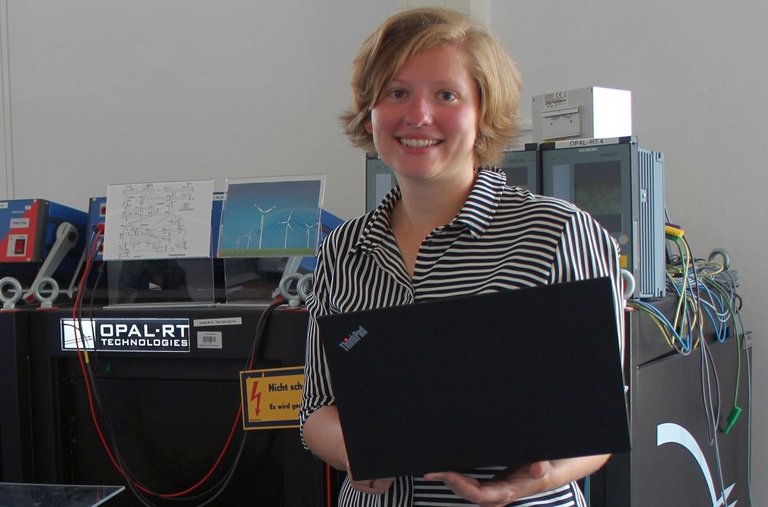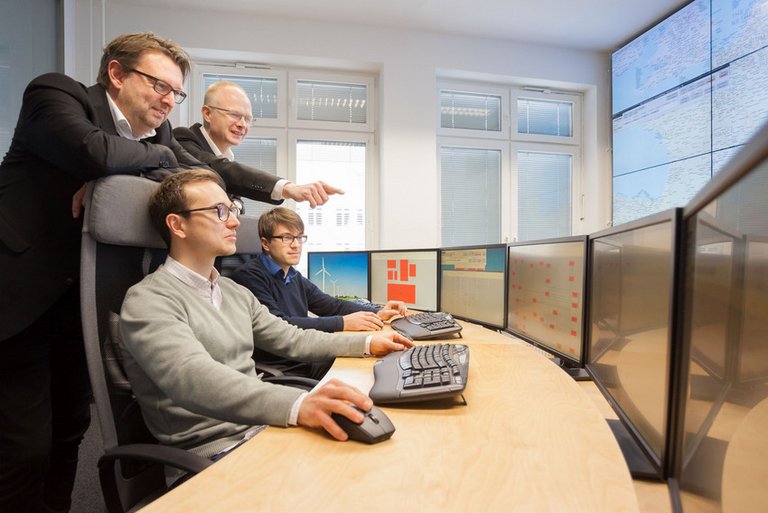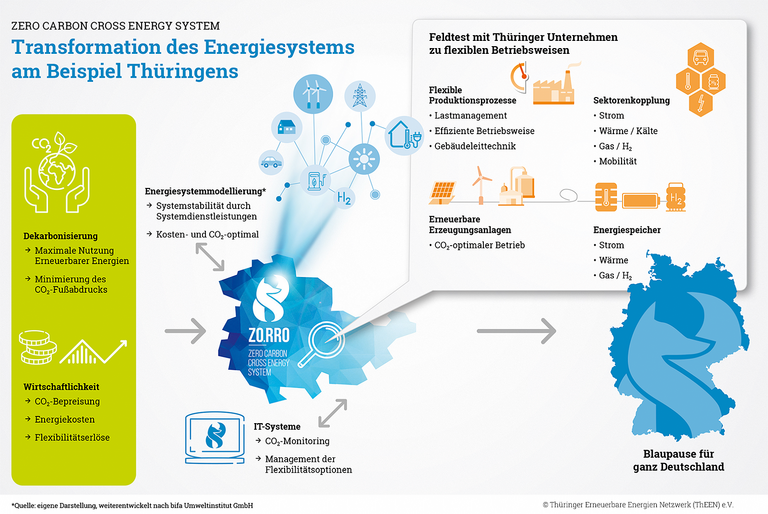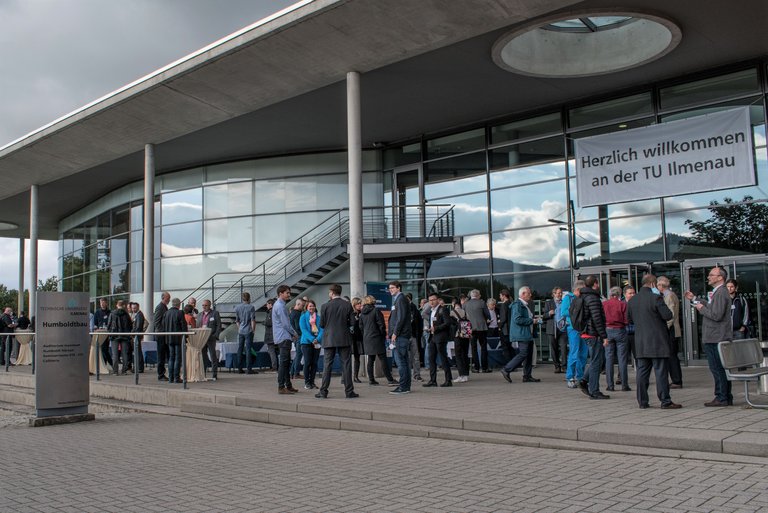How can the energy supply be operated CO2-free and stable at the same time? This is what the joint project ZO.RRO is investigating. Elisabeth Feldhoff, doctoral student and research assistant at the Electrical Power Supply Group at the Thuringian Energy Research Institute (ThEFI) at TU Ilmenau. What drives her? What are the challenges? And what makes the exchange with other disciplines and industry so valuable for her? We talked with her about this.

Ms. Feldhoff, have you wanted to become a researcher, even as a child?
I grew up with two older sisters, and they were always very interested in science and both chose math and physics as their advanced courses. That's how I grew up with the understanding that it's quite normal for a woman to go in a technical direction. However, it only became clear that I would go in the direction of electrical engineering in the course of high school.
How exactly did it come about?
I come from the Ahrtal, and at that time I did an internship in the electronics workshop at the university in Bonn – actually with the aim of attending physics lectures. There were also a few physics students in the workshop who were building a Tesla transformer, and that was super exciting for me.
How did you end up in Ilmenau from Bonn?
I took a detour via RWTH Aachen, which is a very large university. I realised very early on in my Bachelor's degree: A big university like that has its advantages, but I really missed the support and the direct contact. So I started looking around: Where are the smaller universities? How are they positioned in terms of content? Is it a good fit for me in terms of subject matter? Ilmenau was a very good fit for my interest in automation technology. That's why I switched here for my Bachelor's degree.
What finally brought you from automation technology to energy technology?

In my bachelor's degree, I already took the subject EES2 with Professor Westermann, i.e. fundamentals of the operation and analysis of electrical energy systems. I found that very interesting and it raised many in-depth questions. Then I did my specialist internship at the Fraunhofer Institute for Applied Systems Engineering IOSB-AST, also here in Ilmenau, and ended up in the Energy Department, now Cognitive Energy Systems. That's how I developed more and more in the direction of energy technology.
In the course of supervising my Bachelor's thesis, Prof. Westermann then drew my attention to the research-intensive Master's degree, now Electric Power and Control Systems Engineering. In addition to the technical content, the focus here is also on learning methodological skills and the introduction to concrete research activities.
In other words, the step from the Master's degree to the doctorate was not that far for you?
Thanks to my integration into the subject area, my research work and my student assistant activities, I was definitely prepared for my doctorate in a different way than if I had only spent half a year writing my master's thesis, as is often the case. But from a personal point of view and the lack of project experience, the step from the Master's to the doctorate was a huge step! Working together with project partners in industrial projects is something completely different and also involves significantly more responsibility. Because we are the consortium leader in the research project ZO.RRO, short for Zero Carbon Cross Energy System, we guide the project partners, develop the ideas, and have to do the performance reviews. Personally, I have learned an incredible amount.
Energy technology is a very exciting and highly topical subject right now. What exactly is the joint project ZO.RRO, in which you are involved, about?
The establishment of renewable energies in Germany is progressing, brings with it new challenges for system stability due to volatility and requires the use of measures to maintain it, some of which are associated with highCO2 emissions. This is where the ZO.RRO project comes in and tests how generators and consumers interact in an optimal CO2-free system and participate in cross-sector grid management.
So the main focus of the project is on system services?
Exactly, and the question of how flexibilities can be provided in a system with cross-sector grid management with a minimum of CO2 through the participation of industry. At the moment, our energy supply grid is still designed for large power plants and the system services, i.e. the measures that are used, among other things, to maintain grid stability, lead to highCO2 emissions due to the use of conventional power plants.
In a second project phase starting in the middle of next year, we would like to show how small and medium-sized companies can also contribute to the provision of flexibility, CO2 savings and, at the same time, stable grid operation through simple and low-threshold access.
What exactly are you personally involved with?
My main task in the first phase of the project is the development of a simulation tool for mapping cross-sectoralCO2-minimal system services, i.e. with consideration of the energy distribution infrastructure in a high temporal resolution, in order to go beyond balance sheet approaches. Together with my colleague Steffi Naumann from Fraunhofer IOSB-AST, we are developing simulation systems with which we can implement the planning of a CO2-free and, under this premise, cost-optimal energy supply.
What will happen in the second phase of the project?
In the second phase of the project, my focus during the field test will be on the development of the so-called ZO.RRO signal, among other things. This signal is intended to encourage companies to provide CO2-minimal flexibilities, i.e. to behave in a grid-serving manner by flexibly controlling production processes depending on the availability of renewable energies and to contribute to system stability, while at the same time meeting the industry's requirements so that no financial disadvantages arise. We have to take industry with us if we want to think through and implement an energy transition together.

How realistic do you think the goal of decarbonising industry is?
We have now been able to inspire around 25 companies in Thuringia to participate in the second phase of the project, and around 55 across Germany. That means that this is definitely a topic that companies are concerned about. And I am of the opinion that the large companies will soon say: We will only work with suppliers who can show us how much CO2 they emit, if not: we only want suppliers who minimize their CO2 emissions and only work with suppliers with the lowest CO2 emissions. Then it will be decided whether a company is in a position to comply with this or to derive from it: What can we change to produce CO2-minimal or even CO2-free?
As a result, even smaller companies will have no choice but to address these issues, and the goal of decarbonizing industry will become much more tangible. The storms in the Ahrtal have once again woken us up and shown us that my generation is the one that has to implement the energy turnaround. I think it's not a question of whether it can be done, but how it can be done. And that's the question we're trying to answer.
How do you manage to balance this project work and the work on your dissertation?
The challenge is that I not only cover the scientific side and the industrial project side, but I am also involved in teaching, and that sometimes involves working overtime. The great advantage of our department is that, in addition to our doctoral supervisor, we have another very experienced contact person at our side in the form of our senior engineer, who introduces us to the project work in concrete terms and gradually hands over more and more responsibility to us. In general, the supervision at the department is very good, especially with regard to spontaneous opportunities to talk to the professor and his interest in the individual doctoral students. That was also a reason for me to say: The framework, both professionally and personally, is perfect for me here, that's why I'm doing my doctorate here.
How do you think the university could support young female researchers like you even more on their career path?

From my perspective, I wouldn't distinguish between female and male scientists. What I think is a very good initiative on the part of the university is to bring doctoral students together even more across the university, through the Graduate Center and the Science Forum, but also within the ThEFI. The point of the ThEFI is that you don't just exchange ideas within energy engineers, but also with mathematicians and so on. For example, the entire ThEFI is invited to all kinds of doctoral theses defenses, so that every doctoral student has the opportunity to take a look at other disciplines. I can also recommend this to other institutes.
What are your plans for the time after your doctorate?
I will probably be at the university for another two years or so, and there's still a lot I can and want to learn. After that, I'm actually relatively free. I can well imagine going abroad for a while, but my goal is to first go into industry and also look at this side, for example at a transmission system operator.
More about the project ZO.RRO
Information and registration for the ZO.RRO final conference on 6 December 2021
About the Department of Electrical Power Supply
Among other things, the field deals with the future design of electrical energy transmission and distribution, the integration of new basic technologies, optimal operational management, as well as the modeling and analysis of the entire energy system from the transport network level to the end-user plant. ZO.RRO is only one component of this.

